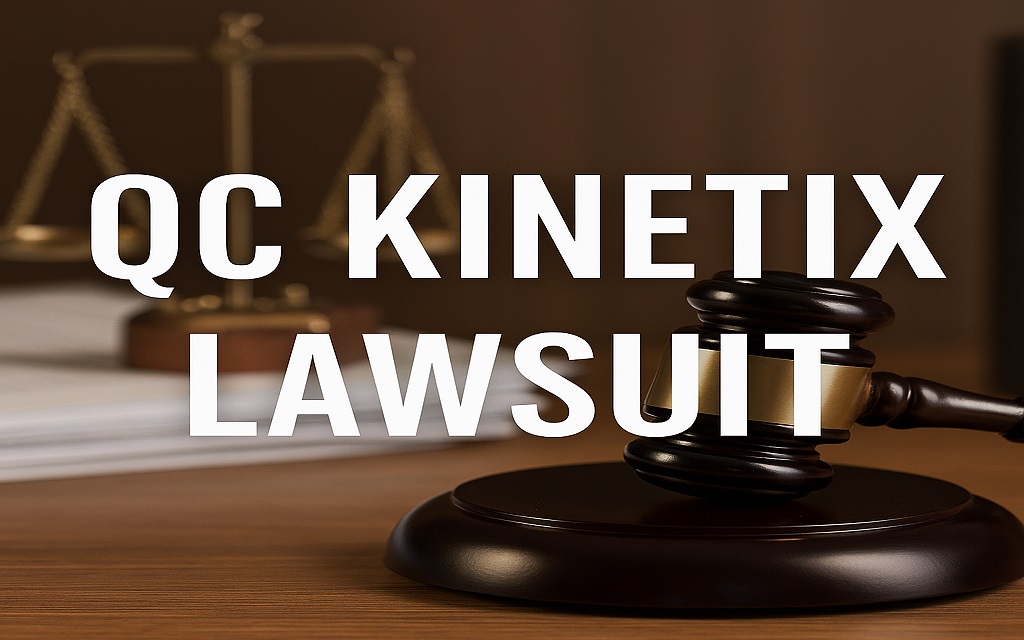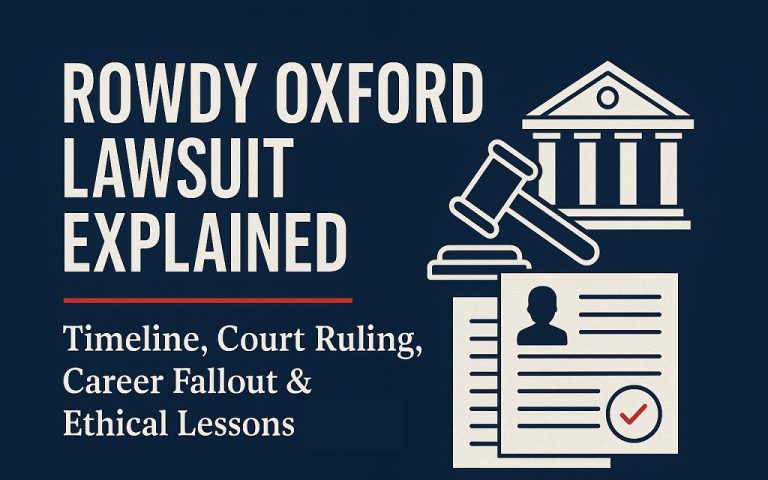You must understand the rising concerns around the QC Kinetix Lawsuit. The company claims to offer regenerative treatments for joint pain. Now it faces lawsuits that question its medical promises and marketing tactics. You will learn how the legal actions unfolded and why they matter to you as a patient or clinic operator.
What Does QC Kinetix Do?
You will find QC Kinetix clinics across the country. The company sells regenerative treatments for arthritis, joint pain, and mobility issues. It promotes platelet-rich plasma therapy, stem cell procedures, and biologics. The website uses bold phrases to attract patients. You often see terms like “drug-free healing” or “natural relief without surgery.”
Please note that the company operates under a franchise model. Independent owners run most locations. The central brand controls the marketing and branding. That setup creates both scale and risk. Clinics follow standard advertising strategies developed by the leading brand. Legal experts warn that this kind of uniform marketing can expose all units to similar liability. You should understand that federal law does not approve stem cell therapies for most uses outside of clinical trials. That fact increases the risk when companies advertise broad effectiveness.
Why Are Patients Suing QC Kinetix?
You may ask why patients filed a QC Kinetix Lawsuit against the brand. The main issues involve misleading statements and financial loss. Here are the key allegations made in court:
- QC Kinetix promotes treatments as FDA-approved
- Patients paid high costs, expecting guaranteed results
- Clinics failed to inform users about the experimental nature of treatments
Patients describe how they were told the therapies would relieve pain permanently. They expected results within weeks. When those outcomes failed to appear, many requested refunds. The lawsuits argue that clinics refused to issue refunds or acknowledge any fault. Legal teams point to state consumer protection laws that bar such tactics. You should be aware that several states have strict truth-in-advertising laws that govern medical treatments. Class action lawyers have used those laws to group patients into unified lawsuits.
What Legal Risks Does the Company Face?
FDA Misrepresentation
You must understand how the FDA regulates medical therapies. Many treatments sold at QC Kinetix are not FDA-approved. The law does not stop clinics from offering them. The problem arises when companies suggest that these treatments have received government approval. In official warnings, the FDA has cited multiple regenerative medicine companies for misleading claims. Courts consider such misrepresentation a serious offense.
Patient Deception
You should notice the language used in promotional material. Phrases like “proven science” and “reliable results” can mislead people. Courts will evaluate if such statements meet the legal standard for fraud or deception. You must realize that advertising cannot promise medical outcomes without clinical backing. Legal experts say that exaggerated marketing often forms the basis for a fraud case in health law.
Franchise Model Issues
It is essential to know how franchise liability works. The QC Kinetix Lawsuit may name both the franchisor and franchisee. Courts will decide who takes responsibility. You must pay attention to how that ruling could shape the future of medical franchises. When a franchise system creates shared scripts and ads, the parent brand may hold indirect liability. That has occurred in other industries, including dental and weight loss clinics.
What Complaints Have Patients Shared?
Online reviews and legal documents mention recurring problems. Many patients report the same issues:
- Therapy results did not meet expectations
- Refunds were denied
- Treatment costs exceeded $5,000
- Staff failed to provide complete medical details
You will read testimonials on sites like Reddit and the Better Business Bureau (BBB), where patients describe feeling pressured to pay in advance. Some users say they were never informed that results were not guaranteed. You should be aware that medical consent requires full disclosure. When clinics fail to disclose critical facts, they risk lawsuits that may involve negligence or consumer fraud. Legal claims often highlight breaches of contract when promised outcomes fail to materialize.
What Are the Wider Impacts on the Industry?
Consider the ripple effect on the broader healthcare sector. Regenerative medicine continues to grow. Lawsuits like this one send a message to other clinics.
Here are potential consequences:
- Marketing language must follow tighter rules
- The FDA may increase inspections
- Clinics will need to adjust consent processes
You will notice that industry watchdogs now focus more on stem cell clinics. A 2023 study in the Journal of the American Medical Association reported that over 60% of U.S. regenerative clinics offer unapproved therapies. Lawsuits and news reports have prompted calls for stricter enforcement of these laws. Some states have proposed new rules that require clinics to include disclaimers about FDA status.
Must Read: Ashcroft Capital Lawsuit: What Investors Need to Know
How Should You Evaluate a Regenerative Clinic?
Before choosing a treatment, you must ask direct questions. Use this checklist to avoid confusion:
- Is the therapy FDA-approved?
- Can the clinic provide peer-reviewed research?
- Does the website clearly state medical limitations?
- Will refunds be issued if results fall short?
You should request copies of scientific studies supporting the treatment. Ask the clinic to explain all risks in plain terms. It is also advisable to verify the local licensing status. You can search your state’s medical board site to see if complaints have been filed. That gives you protection before you commit to a plan.
How Should Clinics Respond?
Clinic owners should review every piece of promotional content. Here are the steps you should follow:
- Use language that matches scientific evidence
- List all FDA disclaimers visibly
- Train staff to explain medical risks clearly
- Monitor franchisee compliance regularly
Legal teams recommend proactive audits. You should prepare now to avoid litigation later. Experts suggest keeping patient intake forms that outline therapy limitations. You should also document all conversations regarding consent. That step creates a paper trail if disputes arise. Several medical boards now require clinics to present patients with written disclosures.
What Is the Takeaway for You?
You must remain vigilant when engaging in health marketing. The QC Kinetix lawsuit offers essential lessons. You should ask questions, verify approvals, and avoid vague promises. Clinics must follow the law or face serious consequences.
Legal outcomes may take time. Still, the message is already clear. Honesty, science, and compliance must lead the way in healthcare marketing.
Take this moment to act wisely. Verify the facts before selecting any regenerative therapy. Hold clinics accountable to proven standards. Your health deserves nothing less. Courts may decide the outcome, but informed choices start with you.
Disclaimer: This article provides a general overview of the QC Kinetix Lawsuit, based on publicly available information, and is intended for informational purposes only. It is not legal advice. It does not constitute legal advice.
Musarat Bano is a content writer for JudicialOcean.com who covers lawsuits, legal news, and general legal topics. Her work focuses on research-based, informational content developed from publicly available sources and is intended to support public awareness. She does not provide legal advice or professional legal services.




